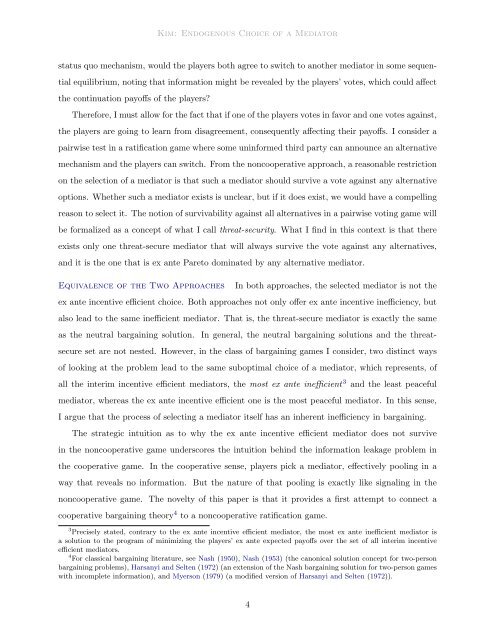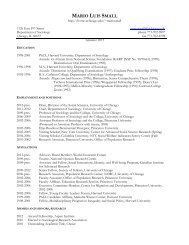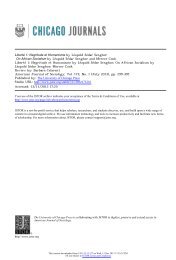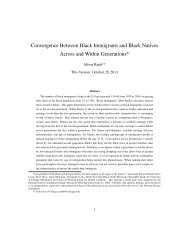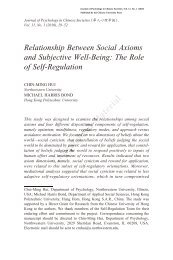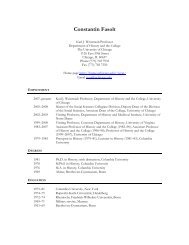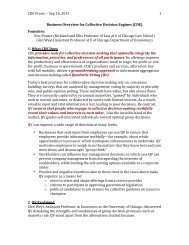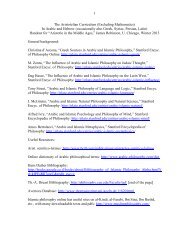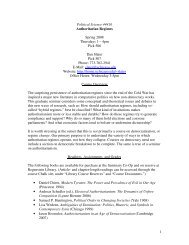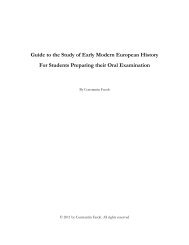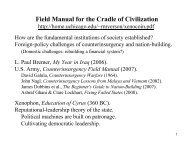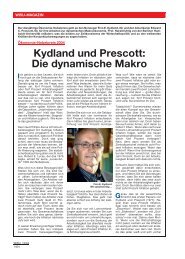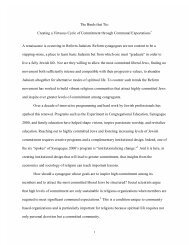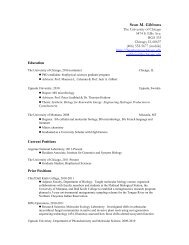Job Market Paper - Personal Web Pages - University of Chicago
Job Market Paper - Personal Web Pages - University of Chicago
Job Market Paper - Personal Web Pages - University of Chicago
You also want an ePaper? Increase the reach of your titles
YUMPU automatically turns print PDFs into web optimized ePapers that Google loves.
Kim: Endogenous Choice <strong>of</strong> a Mediator<br />
status quo mechanism, would the players both agree to switch to another mediator in some sequential<br />
equilibrium, noting that information might be revealed by the players’ votes, which could affect<br />
the continuation pay<strong>of</strong>fs <strong>of</strong> the players?<br />
Therefore, I must allow for the fact that if one <strong>of</strong> the players votes in favor and one votes against,<br />
the players are going to learn from disagreement, consequently affecting their pay<strong>of</strong>fs. I consider a<br />
pairwise test in a ratification game where some uninformed third party can announce an alternative<br />
mechanism and the players can switch. From the noncooperative approach, a reasonable restriction<br />
on the selection <strong>of</strong> a mediator is that such a mediator should survive a vote against any alternative<br />
options. Whether such a mediator exists is unclear, but if it does exist, we would have a compelling<br />
reason to select it. The notion <strong>of</strong> survivability against all alternatives in a pairwise voting game will<br />
be formalized as a concept <strong>of</strong> what I call threat-security. What I find in this context is that there<br />
exists only one threat-secure mediator that will always survive the vote against any alternatives,<br />
and it is the one that is ex ante Pareto dominated by any alternative mediator.<br />
Equivalence <strong>of</strong> the Two Approaches<br />
In both approaches, the selected mediator is not the<br />
ex ante incentive efficient choice. Both approaches not only <strong>of</strong>fer ex ante incentive inefficiency, but<br />
also lead to the same inefficient mediator. That is, the threat-secure mediator is exactly the same<br />
as the neutral bargaining solution. In general, the neutral bargaining solutions and the threatsecure<br />
set are not nested. However, in the class <strong>of</strong> bargaining games I consider, two distinct ways<br />
<strong>of</strong> looking at the problem lead to the same suboptimal choice <strong>of</strong> a mediator, which represents, <strong>of</strong><br />
all the interim incentive efficient mediators, the most ex ante inefficient 3 and the least peaceful<br />
mediator, whereas the ex ante incentive efficient one is the most peaceful mediator. In this sense,<br />
I argue that the process <strong>of</strong> selecting a mediator itself has an inherent inefficiency in bargaining.<br />
The strategic intuition as to why the ex ante incentive efficient mediator does not survive<br />
in the noncooperative game underscores the intuition behind the information leakage problem in<br />
the cooperative game. In the cooperative sense, players pick a mediator, effectively pooling in a<br />
way that reveals no information. But the nature <strong>of</strong> that pooling is exactly like signaling in the<br />
noncooperative game. The novelty <strong>of</strong> this paper is that it provides a first attempt to connect a<br />
cooperative bargaining theory 4 to a noncooperative ratification game.<br />
3 Precisely stated, contrary to the ex ante incentive efficient mediator, the most ex ante inefficient mediator is<br />
a solution to the program <strong>of</strong> minimizing the players’ ex ante expected pay<strong>of</strong>fs over the set <strong>of</strong> all interim incentive<br />
efficient mediators.<br />
4 For classical bargaining literature, see Nash (1950), Nash (1953) (the canonical solution concept for two-person<br />
bargaining problems), Harsanyi and Selten (1972) (an extension <strong>of</strong> the Nash bargaining solution for two-person games<br />
with incomplete information), and Myerson (1979) (a modified version <strong>of</strong> Harsanyi and Selten (1972)).<br />
4


